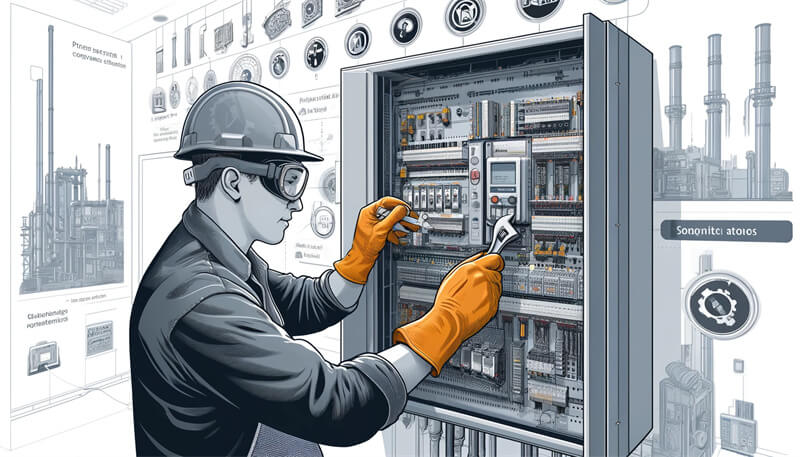Key Takeaways
| Question | Answer |
|---|---|
| What is a Siemens pull section panel? | A flexible, strong panel used in various industrial applications for efficient control systems. |
| Why is proper bolting important? | Ensures stability, safety, and optimal performance of the control panel. |
| What tools are needed for installation? | Wrenches, screws, bolts, safety equipment. |
| What are the steps to bolt the panel? | Positioning, securing, and verifying the installation. |
| Are there any expert tips available? | Yes, including best practices and common mistakes to avoid. |
Introduction
At ControlNexus, established in 2013, we pride ourselves on being a leading provider of Siemens PLCs, HMIs, and Inverters. In this guide, we will walk you through the process of bolting a Siemens pull section panel. Proper bolting is crucial for ensuring the stability, safety, and optimal performance of your control system.
Understanding Siemens Pull Section Panels
Overview
Siemens pull section panels are renowned for their flexibility and strength, making them ideal for various industrial applications. These panels are designed for easy installation, reducing both time and material requirements.
Key Features and Benefits
- Flexibility: Adapts to different installation environments.
- Strength: Durable construction ensures long-term reliability.
- Ease of Installation: Innovative designs simplify the process, saving time and resources.
Preparation for Installation
Required Tools and Materials
Before starting the installation, gather the following tools and materials:
- Wrenches
- Screws and bolts
- Safety equipment (gloves, goggles)
Preliminary Checks and Safety Precautions
To ensure a safe and successful installation:
- De-energize the Panel: Make sure the panel is not connected to any power source.
- Verify the Installation Environment: Check for any potential hazards and ensure the area is suitable for installation.
Step-by-Step Bolting Guide
Positioning the Panel
- Align the Panel: Place the panel in the desired location, ensuring it is properly aligned.
- Mark the Bolt Holes: Use a marker to indicate where the bolts will be inserted.
Securing the Panel
- Insert the Bolts: Carefully insert the bolts into the marked holes.
- Tighten the Bolts: Use a wrench to tighten the bolts securely, ensuring the panel is firmly attached.
Verifying the Installation
- Check the Stability: Ensure the panel is stable and does not wobble.
- Inspect the Bolts: Make sure all bolts are tight and properly secured.
Technical Specifications and Considerations
Siemens panels come with specific technical requirements that must be followed to ensure optimal performance:
- Material Requirements: Ensure you are using the correct materials as specified by Siemens.
- Simplified Wiring: These panels are designed to simplify the wiring process, reducing installation time.
Expert Tips and Best Practices
Common Mistakes to Avoid
- Over-tightening Bolts: This can damage the panel and reduce its effectiveness.
- Ignoring Safety Precautions: Always wear safety equipment and follow proper procedures.
Best Practices for Long-Term Durability
- Regular Maintenance: Periodically check the bolts and panel for any signs of wear or damage.
- Use of Recommended Tools: Always use tools that are recommended by Siemens for installation.
Frequently Asked Questions (FAQs)
What are the Best Practices for Securing the Panel?
- Align Properly: Ensure the panel is perfectly aligned before bolting.
- Use Correct Tools: Utilize the recommended tools to avoid damaging the panel.
- Tighten Evenly: Tighten the bolts evenly to distribute pressure.
How to Handle Specific Challenges During Installation?
- Obstructions: Clear any obstructions before positioning the panel.
- Difficult Bolting Points: Use flexible tools to reach difficult areas.
- Re-tightening: Periodically check and re-tighten bolts if necessary.
Maintenance Tips Post-Installation
- Regular Inspections: Schedule regular inspections to ensure the bolts remain tight and the panel is secure.
- Environment Check: Ensure the installation environment remains suitable and free from corrosive elements.
- Update Equipment: Upgrade tools and materials as recommended by Siemens for ongoing maintenance.
Conclusion
Properly bolting a Siemens pull section panel is crucial for ensuring the longevity and efficiency of your industrial control systems. By following this guide, you can achieve a secure and stable installation, benefiting from the flexibility and strength of Siemens panels. Regular maintenance and adherence to best practices will further enhance the performance and reliability of your setup.
For additional information and resources, visit the Siemens PLCs page or contact our expert team at ControlNexus, where we are dedicated to providing top-notch Siemens industrial control products.
Additional Resources
- Understanding Siemens PLC Data Types
- Mastering Siemens PLC Programming
- Comprehensive Guide to Connecting Your Siemens PLC with an HMI
- How to Program Timers into a Washing Machine Using Siemens PLC
For any further assistance or specific inquiries, do not hesitate to contact us.
ControlNexus, established in 2013, remains a trusted provider of Siemens PLCs, HMIs, and Inverters. Visit our website to explore our extensive range of Siemens industrial control products and to learn more about our offerings.



